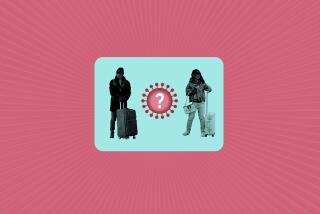When it’s safe to fly home after having a heart attack abroad
- Share via
THE good news: Regular vacations can reduce your risk of having a heart attack. The bad news: The extra stress of travel also may increase your risk of having one. So what happens if you have a heart attack while you’re far from home?
When medical care is comparable to that in the United States, experts generally advise travelers to get treatment and wait about three weeks before flying home. That’s the safe way to reduce the risk of complications.
Now a new study has found that patients who have had uncomplicated heart attacks, those with no complications such as blood clots or abnormal heart rhythms, can safely make the trip home after two weeks or less, if they have a medical escort.
Dr. Martin Thomas and his colleagues from the Royal Sussex County Hospital in Brighton, England, and Healix International, a medical repatriation company based in London, evaluated 213 travelers who suffered a heart attack while traveling between April 2004 and November 2005.
Patients were treated, stabilized and taken on a commercial airline, with a doctor escort provided by Healix.
Patients were moved from six to 38 days after they had the heart attack. The average wait time was 13 days. Seventy percent flew home fewer than 14 days after the attack, and 30% traveled more than 14 days later because they were farther away.
No serious complications occurred, the researchers reported in a recent issue of the British medical journal Heart.
“Until our paper,” Thomas wrote in an e-mail, “there was very little published data on the safety of aeromedical repatriation. The duration of flight does not appear to confer additional complications.”
Two cardiology experts who were not involved with the research say the study makes sense, though they emphasize that the findings apply only to uncomplicated heart attacks.
Dr. Ravi Dave, a cardiologist at UCLA Medical Center and associate professor at UCLA’s David Geffen School of Medicine, said researchers hedged their bets by sending medical escorts with heart attack patients in case anything happened. In clinical practice, he and other doctors send heart patients home in two weeks, if possible -- sometimes without medical escorts.
Dave thinks having a defibrillator and supplemental oxygen on an airplane make flying safe enough for heart attack patients, even without a doctor present.
Under a Federal Aviation Administration ruling in 2004, U.S. airplanes that weigh more than 7,500 pounds (virtually all commercial airplanes) and have at least one flight attendant must carry defibrillators, the mechanical devices that restore normal heart rhythms.
Many U.S. airlines provide supplemental medical oxygen in portable devices when ordered for passengers who have breathing and other health problems, although it is not a requirement of the Department of Transportation.
“It’s very important to emphasize that this applies to uncomplicated [cases of] individuals who have received early, effective treatment,” Dr. P.K. Shah, director of the division of cardiology at Cedars-Sinai Medical Center, said of the study results. “It may not be applicable to patients who are complicated [cases] or have long distances to travel without a physician escort.”
And for flights of 10 or 12 hours, Shah says, there’s an increased risk of getting a blood clot. To lower the risk, physicians sometimes give an injection of heparin before the heart patient boards.
When necessary, a medical escort (a physician or other health-care provider) is covered under many emergency medical evacuation policies, said Kathy Barlow, a spokeswoman for Travel Insurance Services in Walnut Creek, Calif.
Heart patients who recover and are cleared to travel can take steps to reduce their risk of heart problems on the road, Dave says. Among his tips:
* Arrive at the airport earlier than recommended so you don’t have to rush.
* Avoid crowded travel times; fly off-peak hours.
* Request a wheelchair to take you to the gate.
* Avoid drinking alcohol and eating salty foods en route.
* Carry little hand luggage; check it instead. But always keep medications with you.






